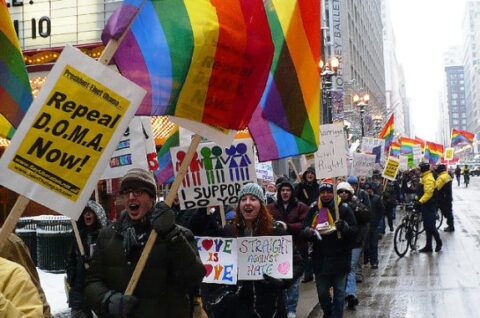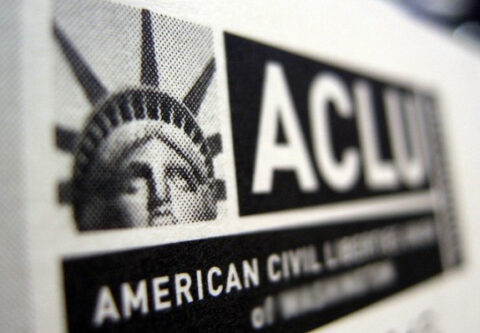Immigration Courts

Pending a Resolution of DOMA, Immigration Judges Should Exercise Discretion to Stay Removal Cases
BY BETH WERLIN AND VICTORIA NEILSON To date, five states plus the District of Columbia celebrate marriages of gay and lesbian couples and several other states honor such marriages. In addition, five countries, including Canada, permit marriages of gay and lesbian couples and at least fourteen additional countries recognize same-sex relationships for immigration purposes. Yet, because the U.S. immigration agencies rely on section 3 of the Defense of Marriage Act (DOMA)—defining marriage as a union between one man and one woman—lesbian and gay U.S. citizens and lawful permanent residents are barred from obtaining immigrant visas for their spouses, visas that are available to heterosexual U.S. citizens and residents with foreign-born spouses. Gay and lesbian noncitizens also are precluded from obtaining other immigration protections, including relief from removal, based on a marriage to a U.S. citizen or permanent resident. As a result, families are separated and spouses of U.S. citizens and lawful permanent residents are deported from the United States. Read More

States that Passed Arizona-style Immigration Laws Now Face Costly, Uphill Legal Battles
Despite repeated warnings from business groups, tourism and industry boards and advocates about the hefty price tag attached to Arizona-style legislation, state lawmakers continued to push “get tough” copycat proposals. Many ultimately rejected SB1070-style legislation (26, to date) due to high costs and political backlash, while others severely watered down, altered or put on hold legislation targeting undocumented immigrants. But states that did pass anti-immigrant legislation, like Georgia and Indiana, now face costly, uphill legal battles. Read More

CIS Report Marred by ‘Deception and Disorder’
By Anam Rahman In a report issued earlier today, the restrictionist Center for Immigration Studies (CIS) took aim at problems facing the U.S. immigration court system—a topic worthy of serious discussion. Unfortunately, as with many of CIS’ publications, today’s report combines dramatic rhetoric and unsubstantiated data with ill-conceived solutions. While it is unlikely the report will gain traction in Congress or the media, a few of its—and its author’s—shortcomings remain worth pointing out. Read More

Immigration Court Backlog Likely to Get Worse Before It Gets Better
Our nation’s immigration courts are backlogged. Historically backlogged. At the end of last year, more than 260,000 cases remained pending before immigration judges. Across the country, the average wait was nearly sixteen months. In California, thousands of cases have been pending for more than two years. While justice is not always swift, our immigration courts are getting increasingly further from the finish line. Read More

Another Study Highlights Need for Legal Representation in Immigration Court
Findings released last week by the New York Immigration Representation Study reveal what immigration advocates long have said: whether a person has legal representation is a critical factor in obtaining a favorable result in immigration court. The findings—which are based on a study of individuals apprehended in New York from October 2005 through December 2010—show that amongst noncitizens who are not in detention, 74 percent of those with lawyers obtained favorable outcomes, versus only 13 percent of those without lawyers. Amongst noncitizens in detention, 18 percent of those represented by attorneys obtained favorable outcomes in immigration court, versus only 3 percent of those who lacked representation. Read More

ACLU Files Lawsuit Against Utah’s Immigration Enforcement Law
Today, the American Civil Liberties Union (ACLU), National Immigration Law Center (NILC), and the law firm of Munger, Tolles & Olsen filed a class action lawsuit against Utah’s HB 497— an SB1070-inspired immigration-enforcement bill. Last March, Utah passed three distinct immigration bills that collectively were designed to go beyond the enforcement-only approach of Arizona’s SB1070 through the addition of state-based guest worker programs. Those programs, however, do not go into effect until a host of other conditions are met, leaving the enforcement provisions of HB 497 as the only part of the Utah plan with any teeth. Set to go into effect on May 10, HB 497 presents many of the same Constitutional challenges as SB 1070, thus making a court challenge inevitable. Read More

Four Cheers for the Ninth Circuit’s Ruling on SB 1070
In a clean sweep for the rule of law, the U.S. Court of Appeals for the Ninth Circuit upheld a preliminary injunction yesterday against four key provisions of SB 1070—Arizona’s notoriously misguided attempt to drive undocumented immigrants from the state. The court’s comprehensive ruling left in place a lower court decision from July which temporarily blocked much of the measure from going into effect. Though the future of the case is far from settled, the upshot of the decision is clear: the federal government, and the federal government alone, sets the terms for enforcing federal immigration law. Read More

Despite Limits, How Padilla v. Kentucky Will Endure
Retired Supreme Court Justice John Paul Stevens, author of the Padilla v. Kentucky opinion. Immigrant advocates rejoiced last spring when the Supreme Court made clear in Padilla v. Kentucky that criminal defense lawyers must inform noncitizen clients if pleading guilty to a particular crime could result in their deportation. Since then, the Court’s ruling has provided much-needed relief for many immigrants whose lawyers failed to properly advise them. At the same time, however, the immigrants’ rights community is realizing that the decision has its limits and will not help all noncitizens whose lawyers failed to give such advice in the past. Read More

Despite Limits, How Padilla v. Kentucky Will Endure
Retired Supreme Court Justice John Paul Stevens, author of the Padilla v. Kentucky opinion. Immigrant advocates rejoiced last spring when the Supreme Court made clear in Padilla v. Kentucky that criminal defense lawyers must inform noncitizen clients if pleading guilty to a particular crime could result in their deportation. Since then, the Court’s ruling has provided much-needed relief for many immigrants whose lawyers failed to properly advise them. At the same time, however, the immigrants’ rights community is realizing that the decision has its limits and will not help all noncitizens whose lawyers failed to give such advice in the past. Read More
Make a contribution
Make a direct impact on the lives of immigrants.
